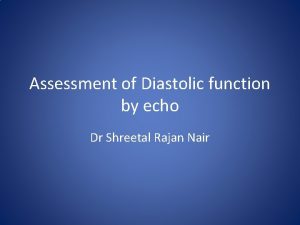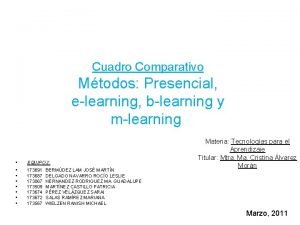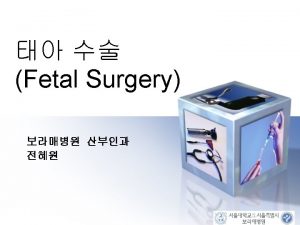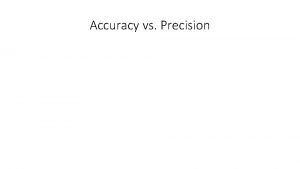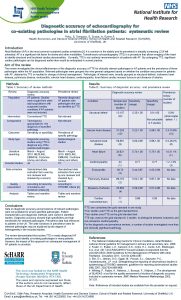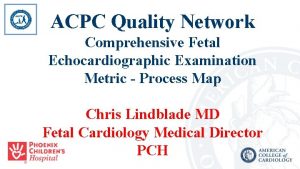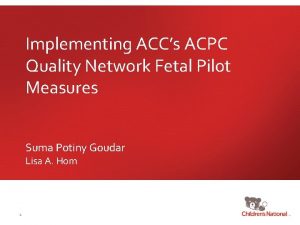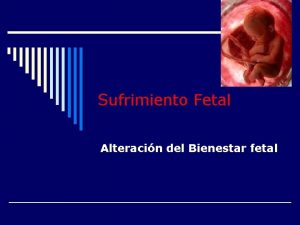Diagnostic Accuracy of Fetal Echocardiography ACPC QNET Learning









- Slides: 9

Diagnostic Accuracy of Fetal Echocardiography ACPC QNET Learning Session March 9, 2021 Kenan Stern, MD Mount Sinai Children’s Heart Center

Diagnostic Accuracy of Fetal Echocardiography • Team (physicians and sonographers) – – – – – Joe Kreeger Anitha Parthiban Sowmya Balasubramanian Rick Michelfelder Chris Statile Ann Kavanaugh-Mc. Hugh Sarina Behera Katie Jo Stauffer Kenan Stern Divya Suthar

Diagnostic Accuracy of Fetal Echocardiography • A significant, and increasing, proportion of CHD is diagnosed prenatally. Prenatal diagnosis allows for advance counseling of the family and helps guide prenatal and postnatal diagnostic and therapeutic options. Appropriate counseling and prenatal planning depends on accurate anatomic diagnosis. • This metric provides a framework for fetal echocardiography laboratories to identify, categorize and analyze diagnostic discrepancies that impact care.

Diagnostic Accuracy of Fetal Echocardiography • Fulfills IAC QI requirement ; – “ 2. 1. 4. 1 C Correlation must be performed with any appropriate imaging modality, surgical findings or clinical outcomes for a minimum of four cases annually with at least two cases per relevant testing area (TTE, TEE, fetal) to be reviewed in QI meetings. ”

Diagnostic Accuracy of Fetal Echocardiography • Numerator - Number of fetal patients with a moderate or severe discrepancy between prenatal and postnatal diagnosis. • Denominator - All fetal patients born during quarter with prenatal diagnosis of significant structural congenital heart disease (CHD), defined as known or highly suspected structural heart disease in the fetus that is expected to require surgical or catheter intervention within the first year of life. • Exclusions – Postnatal diagnosis, not available; ‘suspected’ or ‘possible’ disease (i. e. coarctation); pathology expected to evolve over time (i. e. pulmonary valve stenosis)

Diagnostic Accuracy of Fetal Echocardiography • Minor: Discrepancy between prenatal and postnatal diagnosis with no significant change in clinical management or prognosis. • Moderate: Discrepancy leads to meaningful alteration in clinical/surgical management, but does not involve major change in long-term prognosis • Severe: Discrepancy turns out to be a pathology for which the prenatal counseling with regards to management/prognosis would have differed sufficiently (e. g. single vs. Bi. V), or prompted further testing which would have revealed additional pathology (e. g. genetic conditions), such that family may have considered different care decisions (e. g. termination). – OR • Patient injury or adverse patient event directly related to discrepant diagnosis.

Diagnostic Accuracy of Fetal Echocardiography • Data Collection/Proces s: – Active reporting: Quarterly review of deliveries with prenatal diagnosis – Passive reporting: Diagnostic discrepancies recorded to QI director or designate • Worksheet

Diagnostic Accuracy of Fetal Echocardiography • Labor intensive • Cases of moderate and severe severity may not be sufficiently prevalent enough for centers to target statistically significant reduction. • Definition of significant CHD and categorizations of discrepancies are subjective. Regular discussion and categorization of discrepancies amongst stakeholders at a center may help reduce this variation. • Not all aspects of fetal diagnosis are addressed by this metric (missed diagnoses, discrepancies between fetal examinations).

Diagnostic Accuracy of Fetal Echocardiography • Single center review of 222 prenatal Dx sig CHD – 13. 5% discrepancy rate; half of which were minor, others mostly moderate – Most ‘possibly preventable’ Mozumdar et al, JASE,
